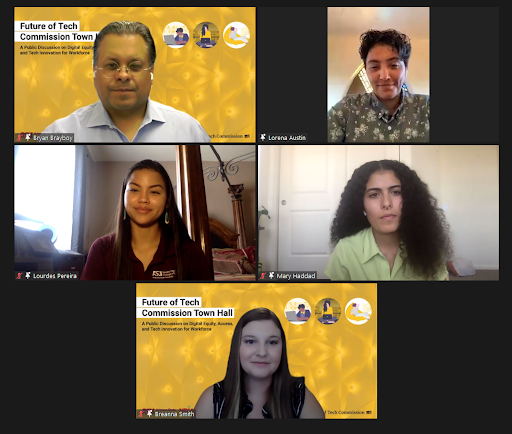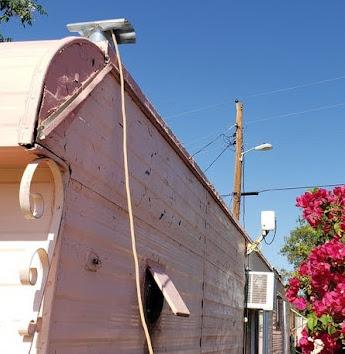Broadband is on the national agenda as leaders aim to address the digital divide, deepened during the pandemic. Leading the narrative are topics of digital equity and inclusion as the federal government rolls out millions in grant funding to support broadband infrastructure.
Arizona State University is advancing a series of discussions, projects and initiatives — in partnership with local, state and national organizations — to move the needle in connecting under- and unserved communities to reliable, high-speed internet. Key to the success is equipping these communities with the tools, resources and skill sets to be able to meaningfully participate in the increasingly digital world in which they work, learn and live.
As we head into a new school year with record-breaking student enrollment for the university, we are taking a look back at the work supported by ASU’s University Technology Office over the summer to further close the digital divide in the Phoenix area and beyond.
ASU hosts the Future of Tech Commission Town Hall
ASU partnered with the Future of Tech Commission (FTC), an independent and bipartisan group of civic leaders developing a comprehensive and inclusive tech policy agenda for the nation, to co-host a virtual town hall this July. The event gathered cross-sector input from the public, leaders and experts to help inform the nation's technology policy agenda.
Nearly 400 participants joined live to hear from 11 leaders, including Arizona Sen. Mark Kelly, about digital equity, access and innovation. Notably, a diverse panel of four ASU students, moderated by ASU's Bryan Brayboy, provided their shared and unique experiences to highlight key insights into the multifaceted barriers to access, especially within rural, tribal communities.
When asked to share their thoughts about what is needed from policy leaders to enact change, Mary Haddad, an ASU student pursuing a double bachelor’s in conservation biology and ecology and in earth and environmental studies, shared: “Beyond providing the physical medium in which to access knowledge, leaders (need to) find it crucial to address both the hard and soft skills necessary for success outside of academia. A critical piece of digital equity is to have the training necessary to navigate the digital tools and online professional workplace, both of which facilitate (people) finding new opportunities.”
The discussions will be used by the FTC to inform policy recommendations going to the White House later this year. Learn more about the FTC town hall, co-hosted by ASU.
Bryan Brayboy (upper left) — President’s Professor in the School of Social Transformation, director of the Center for Indian Education and senior adviser to the ASU president — moderated a discussion between four ASU students as part of the town hall.
‘Lighting Up the Future’ convenes changemakers across Arizona to address the digital divide
A diverse group of partners and organizations from across Arizona are working to advance solutions to close the availability, adoption and utilization gaps facing internet access. Spearheaded by Maricopa County Supervisor Bill Gates and organized under the series titled Lighting Up the Future, the organizations — including ASU, the Institute for Digital Progress, Arizona Commerce Authority and the Sun Corridor Network — hosted virtual roundtable discussions over the summer to address these three gaps and collectively advance solutions to further close the digital divide in Arizona and beyond. Planning for additional virtual roundtables is underway.
One idea to work from for further conversations, as Head of Social Impact for EdPlus at ASU Erin Carr-Jordan put it, is “about more than connecting the unconnected.”
“Imagine an Arizona where every person is engaged and is actively participating in shaping the future of the communities in which they reside,” Carr-Jordan said.
Together, the partner organizations of Lighting Up the Future are working toward creating a statewide plan that will include a network architecture, deployment play and digital fluency toolkit. Learn more about Lighting Up the Future.
Think globally, act locally: ASU’s Digital Equity Initiative
Wireless technologies are being used to extend reliable, high-speed internet into the homes of learners in the greater Phoenix area.
To do so, the initiative will test and deploy new and emerging networking technologies to extend wireless internet access into the homes of learners and families. Recently, the team successfully piloted the use of millimeter wave and 5GHz wireless technologies that extend reliable, high-speed internet into the homes of learners in the greater Phoenix area (pictured right). The pilot brings the group one step closer to realizing their mission of connecting Arizona families to the internet through sustainable and scalable solutions that address the digital divide.ASU’s Digital Equity Initiative is bringing together partners from across the university — including the Watts College of Public Service and Community Solutions and the University Technology Office — to work alongside local organizations and school districts, to connect the under- and unconnected across Arizona.
"This last year has exacerbated the notion that the internet is no longer just ‘nice to have,’” said Lev Gonick, ASU Chief Information Officer. “It is an absolute must-have for our communities to be able to learn, work and live.”
Success of the initiative will measure and demonstrate the effectiveness of technologies in improving student, family and community connectivity to increase and improve access to education, health care and economic development. Learn more about the success of the pilot.
Advancing solutions for digital equity, inclusion and tech innovation
ASU and local partners remain committed to building upon the momentum gathered across these series of events and activities. Combined, these initiatives will help to inform a statewide approach to further closing the digital divide in Arizona and beyond.
More Science and technology

Cracking the code of online computer science clubs
Experts believe that involvement in college clubs and organizations increases student retention and helps learners build valuable…
Consortium for Science, Policy & Outcomes celebrates 25 years
For Arizona State University's Consortium for Science, Policy & Outcomes (CSPO), recognizing the past is just as important as…

Hacking satellites to fix our oceans and shoot for the stars
By Preesha KumarFrom memory foam mattresses to the camera and GPS navigation on our phones, technology that was developed for…


